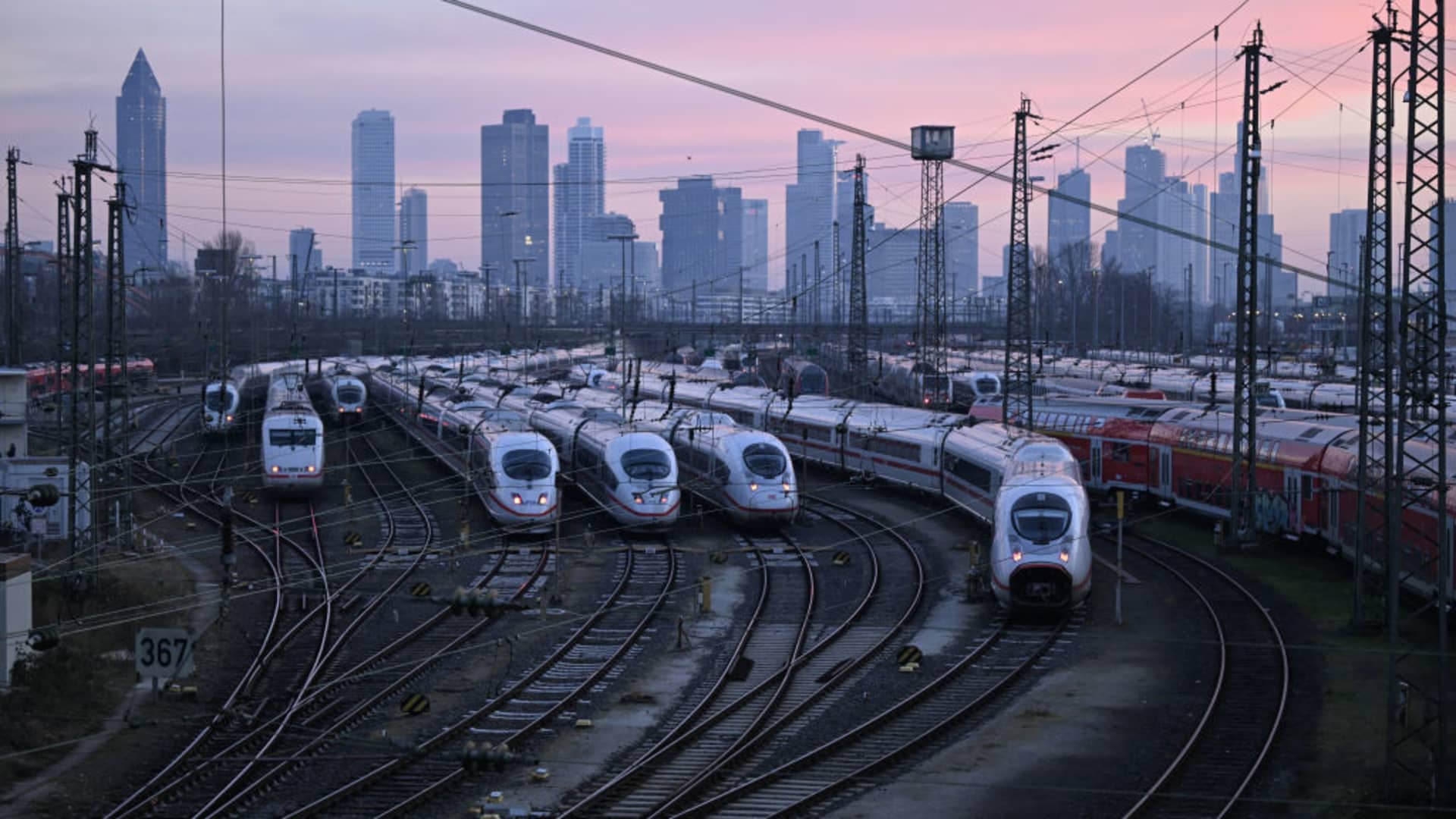
Highspeed ICE trains stand still in front of frankfurt’s skyline at Frankfurt main station, western Germany, on January 10, 2024, as German train drivers start a nationwide three-day strike from after wage talks broke down.
Kirill Kudryavtsev | Afp | Getty Images
Germany is in the grip of major travel disruption.
A three-day nationwide strike called by train drivers from Wednesday to Friday evening has added to travel chaos in Europe’s biggest economy, which was already reeling from ongoing farmer protests.
A walkout by the GDL train drivers’ union has brought rail travel in Germany to a near standstill, with national rail operator Deutsche Bahn only running a pared back emergency timetable for commuters.
Meanwhile, the head of the German farmers’ association DBV on Wednesday reportedly pledged to ratchet up protests, which started earlier this week when hundreds of tractors and trucks parked up by Berlin’s Brandenburg Gate.
In scenes more familiar to neighboring France, farmers in Germany have been blocking roads and highways with convoys of tractors and marching through major cities in a bid to pressure the government to scrap all plans to cut farmer’s subsidies.
“It really looks increasingly like a general strike. We haven’t had a general strike in Germany since 1906,” Carsten Nickel, deputy director of research at advisory firm Teneo, told CNBC’s “Squawk Box Europe” on Thursday.
“It is new in Germany. This concerted action and the level of political violence … the economy minister narrowly escaped, let’s say, physical altercations with a really angry mob of protesters last weekend. Those are scenes that we haven’t seen in Germany before,” Nickel said.
“We are obviously going into a crucial election year, right? Three regional state elections and the European Parliament elections so I don’t think that really bodes well,” he added.
Robert Habeck, Vice-Chancellor and Federal Minister for Economic Affairs and Climate Protection, talks to the journalists on board the Airbus A350 on the flight to Oman.
Picture Alliance | Picture Alliance | Getty Images
In a sign of elevated political tensions over the budget crisis, German Economy Minister Robert Habeck was blocked from disembarking from a ferry on returning from a private vacation last week.
As many as 300 farmers were said to have blocked the ferry from docking in the north of the country, German broadcaster Deusteche Welle reported on Jan. 5, in a protest that was condemned by lawmakers and the DBV agricultural lobby group.
What’s going on in Germany?
Germany’s coalition government, led by Chancellor Olaf Scholz, had sought to repurpose tens of billions of euros in unused pandemic funds to transform the economy and address the climate crisis. The budget plans were thrown into disarray in November, however, when it was ruled that the reallocation of emergency funds was unconstitutional.
The government has since walked back some of its plans for the agriculture sector, saying last week that tax exemptions for agricultural vehicles would continue and subsidies for fuel would be gradually phased out rather than fully axed imminently.
The German Famer’s Association has said these steps do not go far enough and vowed to continue with protests.
Farmers park their tractors in the city center as they demonstrate against government plans to scrap diesel tax subsidies for agriculture vehicles in Dresden, eastern Germany, on January 10, 2024.
Jens Schlueter | Afp | Getty Images
“There was this constitutional court verdict [in November]. The government responded with a series of cuts, cutting back among other things, on those agricultural subsidies and that seems to have been the thing that has triggered these protests,” Teneo’s Nickel said.
“Interestingly, the government already in December reacted and rowed back on some proposals for earlier agricultural cuts,” he continued.
“So, I think there is also an element where these farmers potentially have the idea that ‘well if we keep pushing perhaps the remaining stuff also gets canceled’ and that is ultimately due to a government that is politically and also due in terms of style and communication internally very divided.”
A spokesperson for the German government was not immediately available when contacted by CNBC.
— CNBC’s Sophie Kiderlin contributed to this report.
